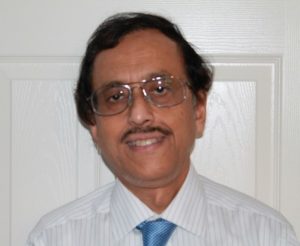Supriyo Bandyopadhyay
Straintronics: Strain-switched Nanomagnets for Digital and Analog Applications
Supriyo Bandyopadhyay
Commonwealth Professor, Electrical and Computer Engineering
Virginia Commonwealth University, Richmond, VA USA
Abstract:
The search for a digital switch that is more energy-efficient than a transistor and hence more amenable to prolonging Moore’s law has recently lead to the notion of a bistable nanomagnetic device that is switched between two stable magnetization states with electrically generated mechanical strain. Logic gates (inverters, Bennett clocked gates, etc.) and memory, predicated on this technology, have been demonstrated in our group. While they indeed dissipate very little energy to operate, their drawback is the high switching error probability which hinders their applications in Boolean computing. They can, however, still be used in applications that are more forgiving of switching errors, e.g. probabilistic (non-Boolean) computing, analog arithmetic circuits, belief networks, artificial neurons, restricted Boltzmann machines, image processors, and ternary content addressable memory. Additionally, they can also be used for non-computing devices such as microwave oscillators that perform better than traditional spin torque nano-oscillators, and even extreme sub-wavelength acoustic and electromagnetic antennas whose radiation efficiencies are relatively unencumbered by their extreme sub-wavelength dimensions. This talk will describe some of these advances.
This work has been supported by the US National Science Foundation under grants ECCS-1124714, CCF-1216614, ECCS-1609303 and CCF-1815303, by the State of Virginia and Virginia Commonwealth University. Some of this work was carried out in collaboration with Prof. Jayasimha Atulasimha of Virginia Commonwealth University and Prof. Amit Ranjan Trivedi of the University of Illinois at Chicago.
Bio:
 Supriyo Bandyopadhyay is Commonwealth Professor of Electrical and Computer Engineering at Virginia Commonwealth University where he directs the Quantum Device Laboratory. Research in the laboratory has been frequently featured in national and international media (newspapers, internet blogs, magazines, journals such as Nature and Nanotechnology, and internet news portals). The laboratory’s educational activities were featured in a pilot study conducted by the ASME. Prof. Bandyopadhyay was named Virginia’s Outstanding Scientist by Virginia’s Governor Terence R. McAuliffe in 2016. His alma mater, the Indian Institute of Technology, Kharagpur, India named him a distinguished alumnus in 2016. His current employer Virginia Commonwealth University bestowed upon him the Distinguished Scholarship Award (given annually to one faculty member in the University) and the University Award of Excellence (the highest honor the University can bestow on a faculty member). His department gave him the Lifetime Achievement Award for sustained contributions to scholarship, education and service (one of two given in the department’s history). His earlier employer, University of Nebraska-Lincoln, conferred on him the College of Engineering Research Award (1998), the College of Engineering Service Award (2000) and the Interdisciplinary Research Award (2001) given jointly by the College of Engineering, the College of Science, and the Institute for Agricultural and Natural Resources. In 2018, he received the State Council of Higher Education for Virginia Outstanding Faculty Award. This is the highest award for educators in private and public universities in the State of Virginia and recognizes outstanding scholarship, teaching and service. Prof. Bandyopadhyay has authored and co-authored over 400 research publications and presented over 150 invited talks and colloquia across four continents. He has also authored/co-authored three classic textbooks that have taught the field of spintronics and quantum device theory to students across the world. Prof. Bandyopadhyay is a Fellow of IEEE, APS, IoP, ECS and AAAS.
Supriyo Bandyopadhyay is Commonwealth Professor of Electrical and Computer Engineering at Virginia Commonwealth University where he directs the Quantum Device Laboratory. Research in the laboratory has been frequently featured in national and international media (newspapers, internet blogs, magazines, journals such as Nature and Nanotechnology, and internet news portals). The laboratory’s educational activities were featured in a pilot study conducted by the ASME. Prof. Bandyopadhyay was named Virginia’s Outstanding Scientist by Virginia’s Governor Terence R. McAuliffe in 2016. His alma mater, the Indian Institute of Technology, Kharagpur, India named him a distinguished alumnus in 2016. His current employer Virginia Commonwealth University bestowed upon him the Distinguished Scholarship Award (given annually to one faculty member in the University) and the University Award of Excellence (the highest honor the University can bestow on a faculty member). His department gave him the Lifetime Achievement Award for sustained contributions to scholarship, education and service (one of two given in the department’s history). His earlier employer, University of Nebraska-Lincoln, conferred on him the College of Engineering Research Award (1998), the College of Engineering Service Award (2000) and the Interdisciplinary Research Award (2001) given jointly by the College of Engineering, the College of Science, and the Institute for Agricultural and Natural Resources. In 2018, he received the State Council of Higher Education for Virginia Outstanding Faculty Award. This is the highest award for educators in private and public universities in the State of Virginia and recognizes outstanding scholarship, teaching and service. Prof. Bandyopadhyay has authored and co-authored over 400 research publications and presented over 150 invited talks and colloquia across four continents. He has also authored/co-authored three classic textbooks that have taught the field of spintronics and quantum device theory to students across the world. Prof. Bandyopadhyay is a Fellow of IEEE, APS, IoP, ECS and AAAS.
